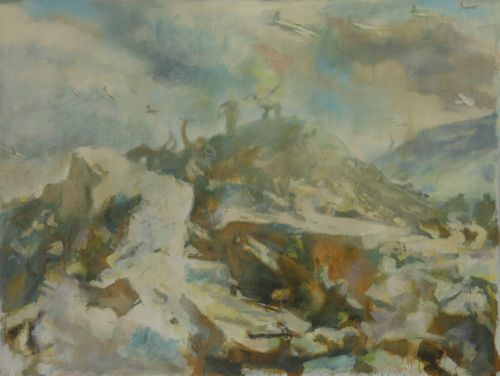Why We Need to Talk About Crimea

Crimea has been a starting point of the Russian war against Ukraine. By dissecting the tumultuous history of Crimea, Cambridge-scholar Rory Finnin argues why returning Crimea to Ukrainian controle is the only path to a sustainable peace.
The Russian war against Ukraine began in 2014 with the appearance of mysterious ‘little green men’ – masked, unmarked soldiers – who suddenly took over Crimea. Now, the Americans seem willing to simply give up Crimea in negotiations with Russia. But history shows us that a Russian Crimea has no future. The idea of a ‘Russian Crimea’ is a colonial phantasm enforced by decades of suppression and ethnic cleansing of the Crimean Tatars.
Renowned British scholar Rory Finnin, expert on Ukrainian history, shows how a peace deal that makes Crimea Russian territory would lay the foundation for a future of further military escalation from the Kremlin. To understand why that is, we need to understand the history, culture and geography of the contested peninsula. Together with Alim Aliev, a human rights activist and journalist who is the Deputy Director General of the Ukrainian Institute, and researcher, PhD and co-curator of the Past / Future / Art memory culture platform art curator Oksana Dovgopolova, Rory Finnin will tell the tumultuous story of Crimea.
Rory Finnin is Professor of Ukrainian Studies at the University of Cambridge and a Fellow of Robinson College, Cambridge. He launched the Cambridge Ukrainian Studies programme in 2008. His new book, Blood of Others: Stalin’s Crimean Atrocity and the Poetics of Solidarity (2022), has won eight international book awards. Anne Applebaum: “Rory Finnin has written the definitive account of cultural responses to a still-hidden atrocity: the deportation of the Crimean Tatars.”
Alim Aliev is deputy director at the Ukrainian Institute and journalist, human rights activist, researcher and manager of educational and cultural projects. He worked as a program director of the state enterprise “Crimean House”, was a member of the supervisory boards of the NGO “Centre of United actions” and the NGO “Educational Center for Human Rights” in Lviv. Aliev is member and rapporteur of advocacy missions to the Council of Europe, the European Parliament, the OSCE, the UN Security Council, EU and US political institutions on the situation in Crimea, and the initiator of the digital museum of deportation of Crimean Tatars “Tamırlar”.
His public and professional activities are focused on the topics of the occupied Crimea, humanitarian policy, the current state of the Crimean Tatar people, freedom of speech and communication strategies.
Oksana Dovgopolova is a co-founder of the Past / Future / Art memory culture platform where she curates public history projects with a focus on artistic practices. She is also a professor of the Master’s program “Pubic History and Memory Work” at the Kyiv School of Economics. The main areas of her research interests are development of the new Ukrainian language of commemoration in the context of Russia-Ukraine war and the image of Odesa in the “memory entrepreneurship”. She was a co-organizer of the artistic research laboratory on war experiences “Land to Return, Land to Care” (2022) and the Memorialization Practices Laboratory in Ukraine (2024). In 2024, she also co-curated the Ukraine’s National Pavilion “From South to North” at the inaugural Malta Biennale of Contemporary Art.
Made possible byDutchCulture About Forum on European CultureWho’s afraid of art? Now that tyrants are on the roll and more and more people in the West seem to be falling for the autocratic alternative, Forum on European Culture 2025 (June 25 – June 29) brings together international artists, writers, and thinkers to celebrate the subversive power of art and literature.